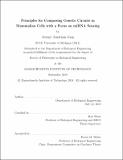Principles for composing genetic circuits in mammalian cells with a focus on miRNA sensing
Author(s)
Gam, Jeremy Jonathan
DownloadFull printable version (65.32Mb)
Other Contributors
Massachusetts Institute of Technology. Department of Biological Engineering.
Advisor
Ron Weiss.
Terms of use
Metadata
Show full item recordAbstract
In this thesis, we developed two synthetic biology frameworks to facilitate the construction of useful genetic circuits, with a focus on circuits that sense miRNAs. miRNAs are an attractive biomarker for sensing since they regulate virtually all biological pathways in plants and animals, and because miRNA sensors can be easily designed by incorporating sequences complementary to the miRNA into a genetic circuit. Therefore, circuits that sense endogenous miRNAs can dynamically respond to cellular signaling or classify between cell types. However, the development of genetic circuits, and especially multi-input miRNA sensors, has traditionally been iterative, costly, and time-consuming. To this end, we have developed a framework to measure miRNA activity and generate accurate predictions for sensors with multiple miRNA inputs. We started by building the largest library of miRNA sensors to date (620 sensors) and used the library to measure miRNA activity in several cell lines. We then constructed multi-input sensors and determined design rules for predicting their function, namely that miRNAs repress targets synergistically in opposite UTRs and antagonistically within the same UTR. In our second framework, we developed a 'one-pot' method for high-information transfection and analysis that allows researchers to quickly determine performance of many tuned circuit variants in a single well. We used our one-pot method to quickly characterize a variety of genetic elements and to optimize the design of a miRNA sensor with inverted logic, a circuit topology we found difficult to design using traditional methods.
Description
Thesis: Ph. D., Massachusetts Institute of Technology, Department of Biological Engineering, 2018. This electronic version was submitted by the student author. The certified thesis is available in the Institute Archives and Special Collections. Cataloged from student-submitted PDF version of thesis. Includes bibliographical references.
Date issued
2018Department
Massachusetts Institute of Technology. Department of Biological EngineeringPublisher
Massachusetts Institute of Technology
Keywords
Biological Engineering.